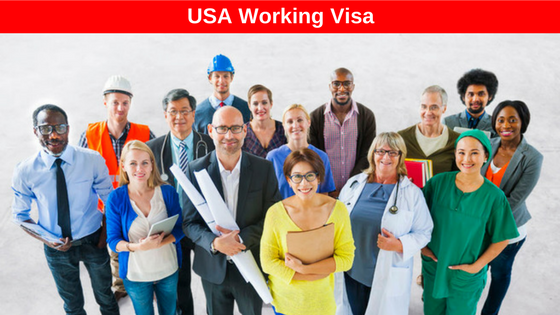Migrating to the United States for employment offers numerous opportunities, but the process can be complex and requires careful planning. This guide provides detailed information on visa options, application procedures, and practical steps to help you successfully navigate the journey from Nigeria to the USA.
Understanding U.S. Work Visa Options
The U.S. offers various work visas, each tailored to specific employment situations. It’s crucial to identify the visa category that aligns with your qualifications and job offer.
1. Temporary (Non-Immigrant) Work Visas
These visas allow individuals to work in the U.S. for a limited period. Common categories include:
-
H-1B Visa: For professionals in specialty occupations requiring at least a bachelor’s degree or equivalent. Fields such as IT, engineering, and finance often utilize this visa. Employers must file a petition on your behalf. Immigration Advice Service+3American Immigration Council+3Travel.gov+3
-
H-2B Visa: Designed for temporary non-agricultural workers in roles like hospitality, construction, and landscaping. Employers must demonstrate a shortage of U.S. workers for the position. Note that the H-2B visa has an annual cap, which may limit availability. Ogletree+1USCIS+1
-
O-1 Visa: For individuals with extraordinary ability or achievement in fields such as sciences, arts, education, business, or athletics. Applicants must provide substantial evidence of national or international acclaim.
2. Permanent (Immigrant) Work Visas
These visas grant permanent residency (Green Card) based on employment:
-
EB-2 Visa: For professionals with advanced degrees or individuals with exceptional ability in their field. A job offer and labor certification are typically required.Boundless+4USAGov+4Immigration Advice Service+4
-
EB-3 Visa: Covers skilled workers, professionals, and unskilled workers. This category also requires a job offer and labor certification. Travel.gov+12USCIS+12Travel.gov+12
Steps to Migrate and Work in the USA
Embarking on this journey involves several key steps:
1. Secure a Job Offer
U.S. employers often initiate the visa sponsorship process. To enhance your job search:Immigration Advice Service+2USponsor Me+2Business Insider+2
-
Networking: Engage with professionals on platforms like LinkedIn, attend industry-specific events, and leverage alumni connections. Many positions are filled through networking rather than online applications. LinkedIn
-
Tailored Applications: Customize your resume and cover letter to align with U.S. standards, emphasizing relevant experience and skills.
-
Job Portals: Utilize websites such as Indeed, Glassdoor, and company career pages to find openings that offer visa sponsorship.USCIS+4Reddit+4USponsor Me+4
2. Employer’s Petition
Once you have a job offer, your employer must file a petition with U.S. Citizenship and Immigration Services (USCIS) on your behalf:Travel.gov+2Immigration Advice Service+2USCIS+2
-
Form I-129: Used for non-immigrant workers, this form is submitted by the employer to petition for your visa. Approval is necessary before you can proceed with the visa application. Wikipedia
-
Labor Certification: For certain visas like EB-2 and EB-3, the employer must obtain certification from the Department of Labor, proving that hiring a foreign worker will not adversely affect U.S. workers.USAGov
3. Visa Application Process
After petition approval:Ogletree+8Immigration Advice Service+8USCIS+8
-
Complete Form DS-160: This online application is required for all non-immigrant visas. U.S. Embassy Nigeria
-
Schedule an Interview: Book an appointment at the U.S. Embassy or Consulate in Nigeria.
-
Prepare Documentation: Gather necessary documents, including your passport, visa interview appointment letter, Form DS-160 confirmation page, approved petition (e.g., Form I-129), and any other supporting materials.
-
Attend the Interview: Be prepared to discuss your employment, qualifications, and intentions in the U.S.Boundless+11USponsor Me+11Reddit+11
4. Medical Examination and Vaccinations
Undergo a medical examination by an authorized physician and receive required vaccinations. Ensure all medical records are up-to-date and comply with U.S. immigration requirements. Boundless
5. Await Visa Decision
After the interview, your application will be processed. If approved, you’ll receive your visa and can make travel arrangements.
Special Considerations for Nigerian Applicants
As of January 1, 2025, applicants must visit the U.S. Consulate General in Lagos at least twice during the immigrant visa process:U.S. Embassy Nigeria+1Travel.gov+1
-
In-Person Document Review: An initial visit to review and submit necessary documents.Travel.gov
-
Visa Interview: A subsequent visit for the formal visa interview.
Plan accordingly to accommodate these requirements.
Alternative Pathways and Recent Developments
Staying informed about policy changes and alternative options is vital:
-
“Gold Card” Visa Program: In April 2025, President Trump introduced a $5 million “Gold Card” visa aimed at ultra-wealthy individuals seeking U.S. residency. This program offers expedited processing and additional privileges. people.com+3the-sun.com+3thesun.ie+3
-
Travel Restrictions: Be aware of any travel bans or restrictions that may affect visa issuance. Regularly check official U.S. government sources for updates.
Practical Tips for a Successful Transition
-
Financial Preparation: Ensure you have sufficient funds to cover visa fees, relocation costs, and initial living expenses in the U.S.
-
Cultural Adaptation: Familiarize yourself with U.S. culture and workplace norms to ease your integration.
-
Legal Compliance: Adhere strictly to visa conditions and U.S. laws to maintain your status and avoid complications.
Embarking on the journey to migrate and work in the USA requires diligence, thorough preparation, and adherence to legal procedures. By understanding the visa options, following the application steps meticulously, and staying informed about policy changes, you can enhance your prospects for a successful transition to employment in the United States.



Sustain the helpful work and generating the crowd!